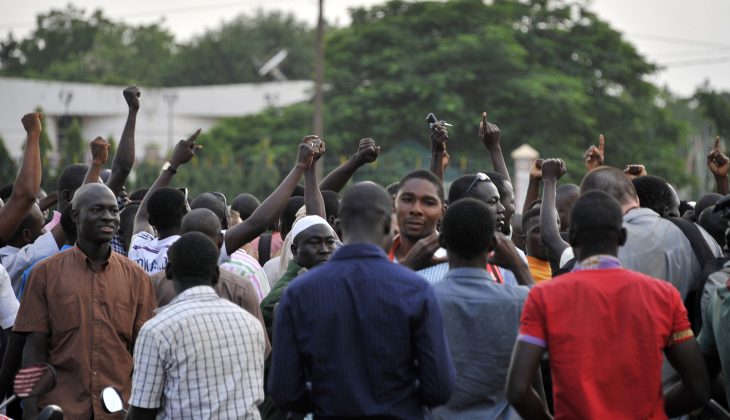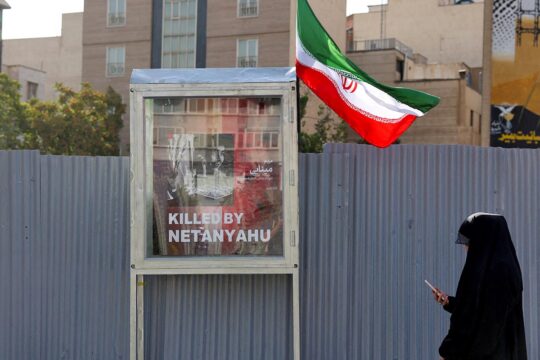Burkina Faso's presidential guard declared a coup Thursday after arresting the interim president and key government figures as the country prepared for its first elections since the overthrow of longtime leader Blaise Compaore.
Lieutenant-Colonel Mamadou Bamba declared on national television that a new "National Democratic Council" had put an end "to the deviant regime of transition" and would form a government leading to "inclusive and peaceful elections".
General Gilbert Diendere, Compaore's former chief-of-staff, was appointed head of the council, which announced a night-time curfew across the west African state, with land and air borders closed until further notice.
Presidential guard members linked to Compaore burst into a cabinet meeting Wednesday and seized acting president Michel Kafando, prime minister Isaac Zida, and two ministers.
Zida was an officer in Compaore's powerful Presidential Security Regiment (RSP) before he toppled his old boss after days of street protests in October 2014.
Diendere told French weekly magazine Jeune Afrique that Kafando and Zida were in good health and would be released.
The coup leaders had been prompted to act, he said, by the "serious pre-election security situation" ahead of presidential and legislative elections due on October 11.
Shots could still be heard Thursday in the capital Ouagadougou after the arrests triggered immediate street protests outside the presidential palace, where the political leaders were being held.
Revolution Square -- the epicentre of protests against Compaore -- was empty apart from military patrols, with the streets of the capital also deserted.
Interim parliamentary speaker Cheriff Sy denounced the takeover and in a interview with Radio France Internationale called on the people to "immediately rise up".
International condemnation was swift, with the United Nations Security Council and the European Union, one of the main donors to the poverty-stricken country, demanding the release of the country's transitional leaders.
- 'Defend the motherland' -
"This incident is a flagrant violation of Burkina Faso's constitution and transitional charter," UN Secretary-General Ban Ki-moon said.
President Francois Hollande of France -- the former colonial power -- joined the chorus of disapproval, calling for political order to be restored.
"I call on these groups to immediately stop what they are doing," Hollande said in a speech to a university near Paris, but added that the 220 French troops based in Ouagadougou "have no reason to intervene".
In a joint statement, the UN, African Union and 15-nation Economic Community of West African States demanded "the immediate and unconditional release of the hostages".
Protesters marching on the presidential palace on Wednesday evening were met with bursts of gunfire, with shooting also heard around the complex Thursday.
Crowds of several hundred shouting "Down with the RSP" gathered with whistles and vuvuzelas near the palace after news of the coup spread, with the headquarters of Compaore's Congress for Democracy and Progress party ransacked.
An AFP reporter who witnessed the protests said it was impossible to verify if anyone had been wounded.
Sy called the detention of the president and prime minister "a serious attack on the republic".
"I call on all patriots to mobilise to defend the motherland," he said, in comments late Wednesday.
Compaore fled into exile in Ivory Coast after a popular uprising triggered by his attempt to extend his 27-year rule.
A transitional government has been charged with running the nation until the elections but Compaore supporters are banned from standing under a controversial law passed in April that made anyone backing "unconstitutional change" ineligible.
- President kidnapped -
Broadcasts by RFI and the private Omega radio station were cut after members of the RSP "burst into the cabinet room at 2:30 pm and kidnapped the President of Burkina Faso Michel Kafando and Prime Minister Isaac Zida, and two ministers (Augustin Loada and Rene Bagoro)," Sy said in a statement to AFP.
Omega boss Alpha Barry told France 24 television that RSP troops had threatened to kill staff if they did not stop transmitting.
The country's main trade unions launched a joint appeal "to observe a general strike... against the RSP interference in politics and for a true democracy".
The RSP sparked a brief political crisis in June by demanding the resignation of Zida, an army lieutenant-colonel and number two in the powerful regiment, who had publicly called for the unit to be dissolved in the interest of national security.
While the RSP's demands were not yet known, it has repeatedly tried to disrupt the ongoing transition.
On Monday, the country's National Reconciliation and Reforms Commission had recommended that the 1,300-man force, considered the landlocked country's best troops, be disbanded.
On the ground, the Balai Citoyen ("Civic Broom") movement, which was at the forefront of last year's anti-Compaore protests, called for protesters to gather to "say no to the coup d'Etat under way", an appeal that was shared widely on social networks.
State television broadcast cartoons and a football match as the dramatic events unfolded. Its buildings have traditionally been guarded by the RSP.





